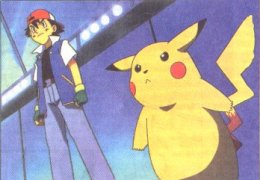| Children.
Their attentions wander. But not fast enough to prevent
"Pokémon: The First Movie." The Pokémon franchise,
Japan's most popular export since the Toyota Camry,
started as a Nintendo Game Boy. Its success begat a TV
cartoon, which begat trading cards. And now, like "Rugrats,"
"Mighty Morphin Power Rangers" and "teenage
Mutant Ninja Turtles" before it, Pokémon is a
feature film.
For kids already
indoctrinated into the cult of Pokémon, the movie amay
add something to the ever-growing mythology surrounding
the characters. For most others, it will be an appealing
diversion, though by no means an exhilarating one. For
those completely on the outside (read: adults), the Pokémon
world is baffling, even somewhat troubling.
The Pokémon
universe is complicated; there are 151 Pokémon
characters, for instance, about 20 of which make
appearances in the film. The human protagonist, Ash
Ketchum (voiced by Veronica Taylor), and his buddies
Misty and Brock are trainers. They capture these "pocket
monsters," the Pokémon, teach them, and pit them
against those of rival trainers. The Pokémon is a
willing gladiator. The trainer is a gerneral--he issues
the commands he hopes will win the battle. The prize:
possession of the Pokémon.
"Pokémon: The
First Movie," sub-subtitled "Mewtwo Strikes
Back," is about a powerful Pokémon gone bad.Mewtwo,
a cat-like biologically engineered Pokémon clone, has
more supernatural strength than any regular Pokémon. (One
of the handful of adult laughs comes from Mewtwo's
decidedly feline character. Pathetic humans, he tells his
creators, I will not serve you. I am superior to all of
you.)
Superiority complex
aside, Mewtwo is racked with existential angst. "Why
am I here?" he says after destroying the lab where
he was created. "What was my purpose?" Well . .
. fear leads to anger. Anger leads to hate. And hate
leads to suffering, right? Mewtwo sets out to wipe the
trainers and their lackey Pokémon off the face of the
planet.
Great Japanese
animation "Pokémon" is not. ("Princess
Mononoke" is still in theaters, if that's what you're
after.) "Pokémon" isn't even good
animation, unless the standard of measure is the crude
LCD graphics of a Game Boy. The characters are flat--apparently
deliberatly so, to resemble the TV drawings. But unlike
the TV program, the film at least contains movement that
is somewhat fluid, and director Kunihiko Yuyama creates
surprising angles and unexpected extreme close-ups.
The film has,
however, been "Americanized." Producer Norman J.
Grossfeld, voice director Michael Haigney and John Touhey
essentially wrote an American script that lays like a
template over the 75-minute Japanese movie. It's
impossible to tell whether Yuyama's vision of the film
remains inctact. The most obvious change is a jarringly
bad pop soundtrack that even second-graders can tell
doesn't suit the film.
But it seems the
Americans have made other, more subtle changes. Writer
Stephanie Strom made a good case in Sunday's New York
Times that the "Pokémon" TV shows is steeped
in Japanese values: responsibility, empathy, respect for
elders, cooperation, obedience and humility. One wonders
what happened to the film, then. There are no elders
present or even mentioned. Only the Pokémon are obedient.
There's very little teamwork between Ash and buddies. To
the contrary, Ash hollers at the wicked Mewtwo, "I
won't let you do that!" That's pure, undiluted
American individualism.
But like most
children's entertainment, the "Pokémon" themes
seem disturbingly unexamined. Aspirations for world
domination aside, Mewtwo objects to the enslavement of
Pokémon to their trainers. Viewed in that context, Ash's
declaration that he cares for his Pokémon seems eerily
antebellum. The whole competition between trainers starts
to look like cockfighting, or worse.
But elementary
schoolers, for whom the world is still fairly two-dimensional,
probably won't be bothered by such thoughts. It's the
parents who might be, as they take their kid back to the
theater for the fourth time to get that last "exclusive"
Pokémon trading card. They will look at their child's
overstuffed binder of cards, the well-worn Game Boy, and
wonder if they've been had. And then the title may start
to seem like a threat: "Pokémon: The First
Movie."
~ MPAA rating:
G. Times guidlines: Pokémon fight one another; attacks
on human protagonist; villain threatens mass destruction.
|


